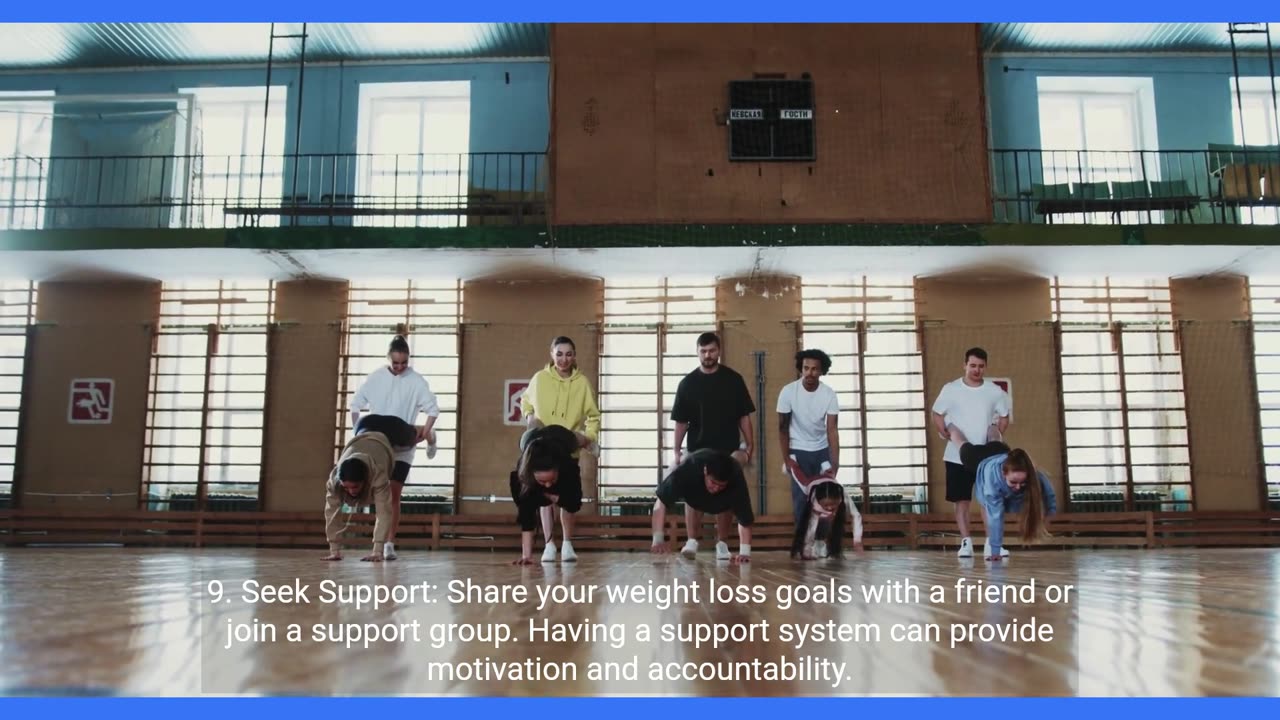Premium Only Content

Loose weight Effectively.
Losing weight in 30 days is a common goal, but it's important to approach it in a healthy and sustainable way. Here are some steps you can follow to help you achieve your weight loss goal:
Consult a healthcare professional: Before starting any weight loss program, it's a good idea to consult with a doctor or registered dietitian, especially if you have any underlying health conditions or concerns.
Set realistic goals: Aim for a safe and sustainable weight loss of 1-2 pounds per week. Trying to lose weight too quickly can be unhealthy and may lead to muscle loss and other issues.
Create a calorie deficit: To lose weight, you need to consume fewer calories than you burn. Calculate your daily calorie needs and aim to eat slightly fewer calories while maintaining a balanced diet.
Adopt a balanced diet: Focus on whole, unprocessed foods, including lean proteins, vegetables, fruits, whole grains, and healthy fats. Avoid or limit sugary, high-calorie, and processed foods.
Control portion sizes: Be mindful of portion sizes to avoid overeating. Use smaller plates, and pay attention to your body's hunger and fullness cues.
Monitor your intake: Consider using a food diary or a calorie tracking app to keep track of what you eat and how many calories you consume.
Stay hydrated: Drink plenty of water throughout the day, which can help control your appetite and support your metabolism.
Eat regular meals and snacks: Consistent eating patterns can help maintain your energy levels and prevent overeating due to extreme hunger.
Exercise regularly: Incorporate a combination of cardiovascular exercise (e.g., walking, jogging, cycling) and strength training into your routine. Aim for at least 150 minutes of moderate-intensity exercise per week.
Get enough sleep: Aim for 7-9 hours of quality sleep each night. Poor sleep can disrupt your metabolism and increase cravings for unhealthy foods.
Manage stress: High levels of stress can lead to emotional eating. Practice stress-reduction techniques like meditation, yoga, or deep breathing exercises.
Be patient and stay consistent: Weight loss takes time, and it's normal to experience occasional setbacks. Stay motivated and focused on your long-term health.
Consider support: Joining a weight loss group, working with a personal trainer, or seeking support from friends and family can help you stay on track.
Avoid extreme diets or supplements: Fad diets and weight loss supplements may promise quick results, but they are often unsustainable and can be harmful. It's best to stick to a balanced and healthy approach.
Track your progress: Regularly monitor your weight, body measurements, and how your clothes fit to gauge your progress.
Remember that weight loss should be about improving your health and well-being, not just reaching a number on a scale. If you're unsure about how to create a personalized plan, consider seeking guidance from a healthcare professional or registered dietitian who can provide you with a tailored approach to meet your goals safely and effectively.
-
 46:03
46:03
SouthernbelleReacts
3 days ago $6.44 earnedShutter Island Reaction | I Did NOT See That Ending Coming! | SouthernBelle Reacts
19.6K2 -
 6:39
6:39
nospeedlimitgermany
1 day ago $4.24 earnedBMW M3 E46 | 343 PS | Top Speed Drive German Autobahn No Speed Limit POV
20K8 -
 LIVE
LIVE
tylerpasta
2 hours ago🔥 Lock ‘n Load with TylerPasta – Warzone Wins & Pasta Power! 🍝💥
34 watching -
 11:41
11:41
Sideserf Cake Studio
21 hours ago $3.12 earnedI Made A Disco Ball Cake!
27.8K6 -
 4:58:51
4:58:51
Steven Crowder
16 hours agoLIVE: No Kings Day - Following The Money w/ Guest: Data Republican | Louder with Crowder
820K437 -
 1:11:45
1:11:45
Man in America
14 hours ago🚨 America Descends Into CHAOS—Are You Prepared?
82.2K64 -
 2:23:54
2:23:54
Badlands Media
1 day agoDevolution Power Hour Ep. 363: Lawfare, Psyops, and the Great Narrative Reversal
106K27 -
 2:32:48
2:32:48
Tundra Tactical
9 hours ago $10.21 earnedSilencers, Senators, and Survival: Roasting Lies and a Security Breakdown of The MN Shooting
65.2K7 -
 10:45:48
10:45:48
Spartan
12 hours agoPro Halo Player | !politics Halo Infinite Ranked Arena into SWTOR and/or Gears Beta
72.9K4 -
 40:25
40:25
The Connect: With Johnny Mitchell
1 day ago $11.26 earnedBlackwater CEO Erik Prince Gets HONEST About The Israeli Invasion Of Lebanon
56.3K54